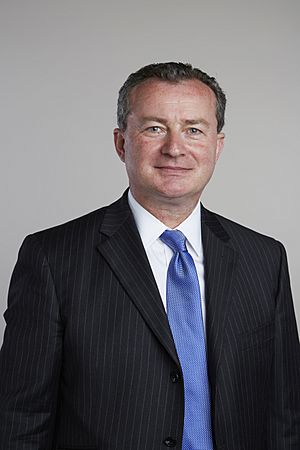Laurence Hurst facts for kids
Quick facts for kids
Laurence Hurst
FRS FMedSci
|
|
|---|---|

Hurst in 2015
|
|
| Born |
Laurence Daniel Hurst
6 January 1965 Ilkley, Yorkshire
|
| Education | Truro School |
| Alma mater |
|
| Scientific career | |
| Fields | |
| Institutions |
|
| Thesis | Intra-genomic conflict and evolution (1991) |
| Doctoral advisor | |
| Doctoral students | Gilean McVean |
Laurence Daniel Hurst, born on January 6, 1965, is a professor who studies how living things change over time. He works in the Department of Biology and Biochemistry at the University of Bath. Until April 2024, he was also the director of the Milner Centre for Evolution, a special research center.
Contents
Learning and Degrees
Laurence Hurst went to Truro School for his early education. He then studied at the University of Cambridge, where he focused on natural sciences. In 1987, he earned his first degree, a Bachelor of Arts.
After spending a year at Harvard University in the United States, he came back to the UK. He continued his studies at the University of Oxford. In 1991, he earned a special advanced degree called a Doctor of Philosophy (DPhil). His research was guided by two important scientists, W. D. Hamilton and Alan Grafen.
Science Career and Discoveries
From 1993 to 1996, Professor Hurst was a special research fellow at the University of Cambridge. Since 1997, he has been a professor at the University of Bath.
How Genes Change Over Time
Professor Hurst's work focuses on how genes and the entire set of genetic instructions (genomes) change and develop. He uses computers and math to understand these changes. His research has looked at many interesting areas, including:
- Genes that are essential for basic cell functions.
- The way genes are arranged in a cell's DNA.
- How bacteria like Staphylococcus aureus and yeast like Saccharomyces cerevisiae become resistant to medicines.
- How sexual reproduction and differences between males and females (sexual dimorphism) have evolved.
Understanding DNA Changes
Professor Hurst studies basic questions about how genetic systems evolve. For example, he looks at why some changes in DNA (mutations) are not as harmful as expected, while others cause more problems.
He found that mutations that change proteins often don't cause much damage. This is because the genetic code, which contains the instructions for building living things, is designed to be very good at preventing errors. He also used special computer models to show why removing some genes has little effect. He also found out which gene removals are not hidden by other genes.
Hidden Effects of DNA Changes
On the other hand, Professor Hurst discovered that some DNA changes, which were once thought to be harmless, actually have important effects. These include changes in the order of genes and changes in "silent" parts of the DNA. He showed that even these "silent" changes can affect how genetic instructions are read and used by cells.
He also found that genes are arranged in groups that affect each other's activity. This means that a gene can influence how other genes nearby work. As of 2015, his research also focused on how these basic discoveries can help in medicine.
Awards and Special Recognitions
Professor Hurst has received many important awards for his work. In 2003, he was given the Scientific Medal by the Zoological Society of London. In 2004, he became a member of the European Molecular Biology Organization (EMBO). He also received The Genetics Society Medal in 2010.
In 2015, he was chosen as a Fellow of the Academy of Medical Sciences (FMedSci). He also became a Fellow of the Royal Society (FRS), which is a very high honor for scientists in the UK. His election to the Royal Society recognized his important discoveries, such as:
- Showing that the genetic code is designed to reduce errors.
- Finding that "silent" DNA changes in mammals are important.
- Discovering that the order of genes is not random.
- Being the first to understand how much a gene is used affects how its protein changes over time.
- Developing new ways to study how living things become fit for their environment.
- Working with other scientists to find a special network of genes in humans that helps create stem cells.
 | James Van Der Zee |
 | Alma Thomas |
 | Ellis Wilson |
 | Margaret Taylor-Burroughs |

